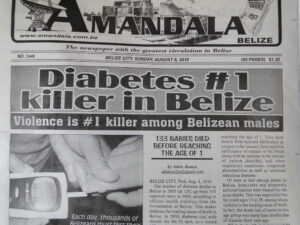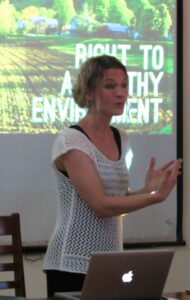Engaged Anthropology Grant: Amy Moran-Thomas

Amy Moran-Thomas is Postdoctoral Fellow in Anthropology at Brown University, specializing in the areas of global health, medical technology, and environmental change. In 2009, while a doctoral candidate at Princeton University, she received a Dissertation Fieldwork Grant to aid research on ‘An Anthropological Study of the Experience of Parasitic Infection and Diabetes in Belize,’ supervised by Dr. Joao Biehl. This year, she was awarded the Engaged Anthropology Grant to return to her fieldsite in the Central American country of Belize to publically share and discuss her research findings about metabolic disorders, focusing in particular on people’s negotiations of causality and care within the emerging global diabetes epidemic.
Three and a half years is a long time to be gone, and it was somewhat disorienting when I first arrived back in Dangriga in July 2014. Some of the people I had known best in Belize were now missing—absences that loomed large when passing homes where friends formerly resided, or locations where we had once talked. In an epidemiological sense, I realize that these deaths are painfully unsurprising (though each one always surprises and shakes me anyway). Yet at least on statistical scales, these losses remain not only predictable, but numerically probable: diabetes, the primary condition that I focused on investigating during my fieldwork about experiences of chronic disease in Belize, has now become the leading cause of death nationwide.
My research in 2009-2010 examined this fast-growing issue, by charting people’s experiences of metabolic disorders in the southern Stann Creek District of Belize. Over time, I came to see these realities also as an ethnographic lens on the larger diabetes epidemic emerging in much of the world today, providing insight into some of its deep challenges and human costs: the complications of negotiating care amid overlaid chronic and infectious conditions; the global political ecologies now contributing to these rising rates of disease, alongside the social fabrics of care that patients turn to in addressing them; and people’s actual treatment experiences amid systems where medical technologies often moved in and out of reach.

This Engaged Anthropology Grant allowed me to return to Belize in the summer of 2014 for the first time since my dissertation fieldwork concluded in 2010, to share and discuss my research findings with Belizean experts and communities who contributed to the project—including local patient groups, government doctors and policy makers, variously positioned caregivers, national intellectuals, and individual patients and families who had worked with me. I began the return trip by revisiting these actors in Dangriga, and also reaching out to several community leaders and local organizations that I was coming into dialogue with for the first time. I additionally visited government offices in the capital of Belmopan, and found myself engaged in very generative discussions about my findings with officials from the Belize Ministry of Health as well as from the Institute for Social and Cultural Research. These collaborative meetings helped lead up to the key event of my trip: a public workshop that I organized in Dangriga, planned in collaboration with Southern Regional Hospital, the Belize Ministry of Health, the National Institute of Culture and History, and Help Age Dangriga.
The workshop took place in the newly refinished ground-floor conference room of Dangriga’s Ecumenical College on August 4, 2014. By a stroke of luck, it turned out that the Dangriga branch of the Belize Diabetes Association (which was not active during the time of my fieldwork) had rebounded since then, and my stay coincided with one of their Saturday gatherings. Several members kindly invited me to make an in-person announcement about my upcoming workshop during their meeting the previous week, which helped build a great crossover audience. I was surprised and honored to see a more sizable group than I had anticipated the afternoon of our workshop. Among the participants were diabetes caregivers; community leaders and prominent cultural advocates; and people actually living with the chronic conditions under discussion.
To kick off our conversation, I gave a brief presentation about my fieldwork and main research findings. I was concerned that examining chronic disease treatment in Belize as such a complicated picture might be disconcerting for people living with these conditions—but interestingly, unlike some pushback I’ve gotten from U.S. academic crowds when discussing these ambiguities, the audience in Dangriga seemed unsurprised on this front, for example offering lively additions to fill out my list of the expensive market prices of vegetables (after all, they knew these difficulties better than anyone, after living with them for years). The distinguished physician who had mentored my fieldwork offered some generous commentary to help open things up, and we launched into what turned out to be an hour-long group brainstorming session that peeled back many layers of interfacing domains of care: pills, herbs, vegetables, farming, cooking, ritual, policy.
Many insights and questions that the group generated deftly linked granular exchanges (such as sharing notes on diabetes-friendly cassava recipes) with macro-realities (such as the astute comment that our Ministry of Health report wouldn’t be able to go very far in changing these constrained nutritional realities unless their office also dialogues with the Ministry of Agriculture, to explore national policies that might sustain more robust vegetable production). Another terrific suggestion included the idea of creating a national recipe contest, as a way of sparking interest in the “Belizean Cooking with Diabetes” project we discussed together. We wondered, could this effort snowball into something that might eventually be assembled and disseminated more widely—perhaps an open-source recipe website or even a collaborative publication—so that people with diabetes didn’t feel faced with a choice between the foods that would keep them healthy, and the foods that many felt most connect them to a sense of family and identity? And more broadly, how might we conceive of tinkering not just with care and education, but also with actual economies of available foods and medicines? Is there some way it might be possible to treat not only patients, but also the political ecologies and unhealthy agricultural systems that make people’s work of survival unnecessarily difficult?
Overall, this collective workshop felt less like the final stage of a completed project, and more like a provocation toward continuing engagements ahead. I am deeply grateful to all of the people who gathered to talk and think with me during this return trip, and for the Engaged Anthropology Grant that made this sustained conversation possible. It is equal parts unsettling and exciting to realize that I am not just observing how new collectives are taking shape around these chronic health issues in Belize, but also becoming a collaborator with perhaps some part still to play in this unfolding story.